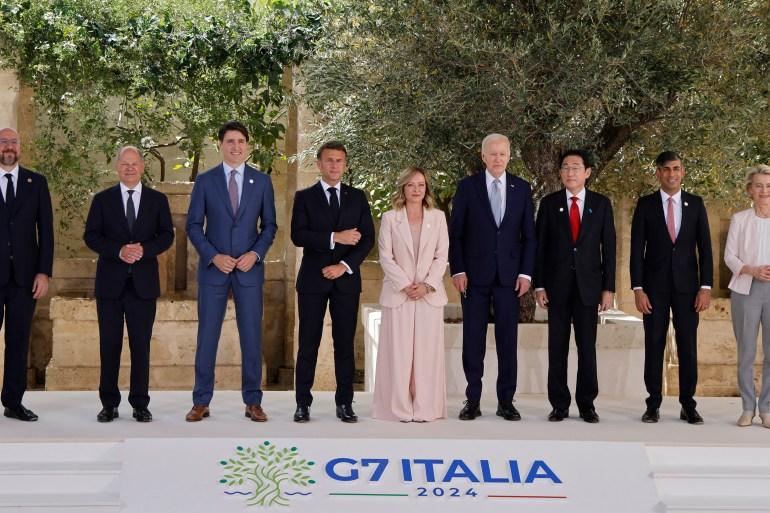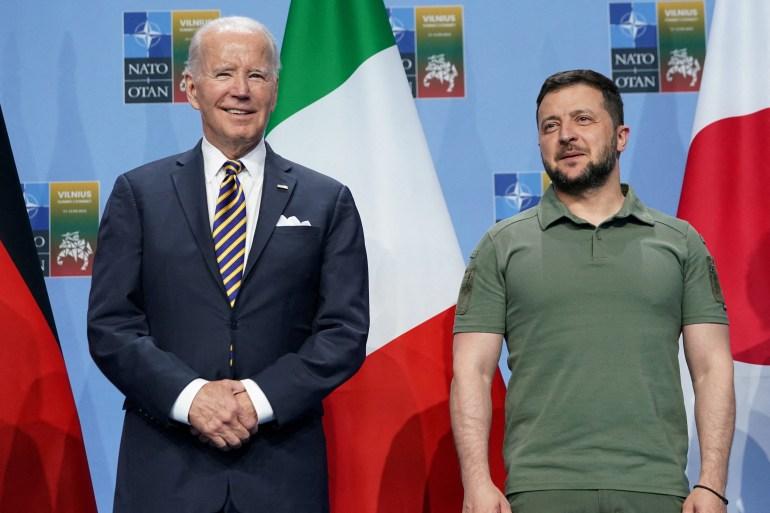Source: ALJAZEERA
ALJAZEERA MEDIA NETWORK

G7 leaders celebrate their unity after deciding to finance Ukraine through the profits on frozen Russian assets during the summit in Italy.
G7 nations have consented to a $50bn deal to finance Ukraine utilizing profits from frozen Russian assets, according to Italian Prime Minister Giorgia Meloni.
“I can confirm that we have reached a political agreement to provide approximately $50bn in additional financial aid to Ukraine by the year's end,” Meloni, who is hosting this year’s G7, stated on Thursday.
Meloni had invited President Volodymyr Zelenskyy to join a special summit session on the Ukraine conflict with US President Joe Biden and the leaders of France, Germany, Canada, Japan, and the United Kingdom.
During the meeting at the luxurious Borgo Egnazia resort, Zelenskyy expressed gratitude to the leaders for their support, emphasizing the importance for both defense and reconstruction and the need for additional weapons.
The G7's plan involves a multi-year loan leveraging profits from around $300bn in frozen Russian funds. The complexity arises if the assets are eventually unfrozen, eliminating the profit channel to repay the loan.
Each G7 nation will contribute to the loan package, European Commission President Ursula von der Leyen confirmed.
“Every G7 member is contributing to this loan. The profits from the immobilized Russian assets in Europe will fund it,” von der Leyen told journalists during the G7 meeting in southern Italy.
“Finance ministers are now hashing out details, such as necessary backstops, and will finalize them as quickly as possible.”
Germany’s Finance Minister Christian Lindner praised the “unity” following the agreement.
“Good news from the G7: another $50 billion for Ukraine,” Lindner posted on X.
German Chancellor Olaf Scholz described the loan agreement for Ukraine reached at the three-day summit, involving major democracies of the Group of Seven (G7), as a “historic step and a historic decision.”
“The next step is to set up the technical mechanisms for implementation swiftly,” Scholz stated.
Scholz affirmed the G7 leaders are sending a clear message to Russian President Vladimir Putin, showing their unity and resolve.
“Putin has a clear strategy: to continue his war until support for Ukraine wanes. This plan has failed today,” Scholz remarked.
“The G7’s decision to mobilize $50bn from the windfall profits of frozen Russian assets lays the foundation for Ukraine’s immediate needs, including weapons, reconstruction, and energy infrastructure.”
 President Joe Biden and Ukraine’s President Volodymyr Zelenskyy pose for a photo with G7 leaders
President Joe Biden and Ukraine’s President Volodymyr Zelenskyy pose for a photo with G7 leaders
French President Emmanuel Macron noted that finance ministers will now work out the details of the agreement.
Reporting from Moscow, Yulia Shapovalova mentioned Russian Foreign Ministry representative Maria Zakharova’s comments, describing the use of these profits as “extremely painful for Brussels” due to Russia's vast holdings in Europe.
“Europe will first have to bear the cost of its actions,” said Zakharova.
Previously, Finance Minister Anton Siluanov indicated that actions against Russian assets in the West would prompt a “reciprocal response” as an equivalent amount of Western funds are frozen in Russia, generating “income” for Russia.
On the same day, US President Joe Biden and Zelenskyy signed a 10-year bilateral security agreement reinforcing Ukraine’s defense against Russia's invasion.
The agreement, signed during the summit, is intended to be a step towards Ukraine’s future NATO membership, as per the deal’s text.
“The parties acknowledge this agreement as a bridge to Ukraine’s eventual membership in the NATO alliance,” the document states.
Zelenskyy has been seeking NATO membership, but allies have refrained from that step. NATO views an attack on one of its 32 members as an attack on all under its Article Five clause.

If there is an armed attack or its threat against Ukraine, top US and Ukrainian officials will consult within 24 hours to plan a response and determine additional defense requirements for Ukraine, the agreement outlines.
Under the agreement, the US reaffirms its support for Ukraine’s sovereignty and territorial integrity amid renewed Russian aggression in Ukraine's east.
“For Ukraine’s security, both nations agree it requires a significant military force, robust capabilities, and consistent investment in its defense industry to match NATO standards,” the text states.
“The US plans to provide long-term materials, training, advising, maintenance, intelligence, and security and defense industry support to develop Ukrainian forces capable of defending a sovereign, independent, democratic Ukraine and deterring future aggression,” it adds.
The summit occurs during a period of global upheaval. Beyond the Ukraine conflict, Israel’s ongoing assault in Gaza and rising economic tensions between China and Western nations are also in focus.
Many G7 nations are facing political uncertainty, with attendees aware this might be President Biden’s last G7 summit if he loses to Donald Trump in the upcoming elections.
UK Prime Minister Rishi Sunak might be ousted in the July 4 elections, while France’s Macron and Germany's Scholz are under pressure from far-right gains in the recent EU Parliament elections.
Conversely, Italy's Meloni is strong following her party's success in the EU Parliament vote.
The summit started with a brief session on Africa, development, and climate change, then moved to the Middle East.
G7 leaders have already announced support for a Gaza truce deal outlined by Biden, which includes the release of hostages taken during Hamas’s October 7 attack on southern Israel.
Moreover, Biden stated he has not lost hope of achieving a Gaza ceasefire agreement but urged Hamas to cooperate.
Asked if a truce deal between Hamas and Israel could be expected soon, Biden responded, “No.”
“I haven’t lost hope, but it will be challenging,” he told reporters. “Hamas needs to act.”
Mediators from the US, Qatar, and Egypt have long sought to establish a ceasefire amidst Israel's deadly Gaza assault, which has resulted in over 37,200 Palestinian deaths and destruction in the densely populated area.
Your email address will not be published. Required fields are marked *